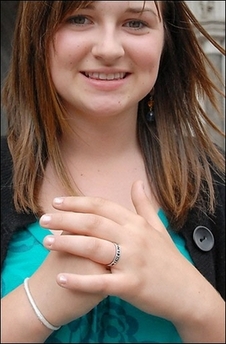Girl loses "virginity ring" battle
(Reuters)Updated: 2007-07-18 16:20
LONDON - A teen-ager whose teachers had stopped her wearing a "purity ring" at school to symbolize her commitment to virginity lost a High Court fight against the ban Monday.
 Lydia Playfoot, 16, displays her "purity ring" as she leaves the High Court of Justice in London, June 2007. [Agencies]  |
"I am very disappointed by the decision this morning by the High Court not to allow me to wear my purity ring to school as an expression of my Christian faith not to have sex outside marriage," Playfoot said in a statement.
"I believe that the judge's decision will mean that slowly, over time, people such as school governors, employers, political organizations and others will be allowed to stop Christians from publicly expressing and practicing their faith."
Playfoot's legal challenge was the latest in a series of disputes in British schools in recent years over the right of pupils to wear religious symbols or clothing, such as crucifixes and veils.
Last year, the Law Lords rejected Shabina Begum's appeal for permission to wear a Muslim gown at her school in Luton. That case echoed a debate in France over the banning of Muslim headscarves in state schools.
Playfoot's parents are key members of the British arm of the American chastity campaign group the Silver Ring Thing, a religious group which urges abstinence among young people.
Those who sign up wear a ring on the third finger of the left hand. It is inscribed with "Thess. 4:3-4," a reference to a Biblical passage from Thessalonians which reads: "God wants you to be holy, so you should keep clear of all sexual sin."
During the case, Playfoot's lawyers argued that the ban by her school in Horsham, West Sussex, breached her human rights to "freedom of thought, conscience and religion" which are protected by the European Convention on Human Rights.
Lawyers for the school denied discrimination and said the purity ring breached its rules on wearing jewelry.
They said allowances were made for Muslim and Sikh pupils only for items integral to their religious beliefs and that, for the same reason, crucifixes were also allowed. But it argued that the purity ring was not an integral part of the Christian faith.
Playfoot said in her statement she would consult her legal team to consider whether to appeal.
|
|
|
||
|
||
|
|